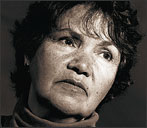

BEATRIZ MANZ
Beatriz Manz has to sleep on the dirt floor of a village chapel when she treks to the Guatemalan jungle to do research.
There's no electricity, so when night descends, it's truly dark. She can't even see her own hands. Still, she peers out into the night, squinting, trying to see.
"Is anyone there?" she worries.
Manz, 54, a Berkeley professor of geography and ethnic studies, has had reason to worry in the impoverished, unstable country. She's a member of what the press has called a "tough, high-risk sorority" of human rights activists and anthropologists who for years have documented the Guatemalan "disappeareds" -- thousands of men, women and children, most of them poor Mayan villagers, who began vanishing without a trace in the early 1980s during the country's brutal military crackdown.
The violence began when the Guatemalan government started to fear guerrilla activity in the jungle and highlands and descended on the villages there to stamp it out.
Manz blames the country's former government officials and its military for kidnapping and murdering many jungle peasants and those who befriended them.
Manz and all her colleagues investigating the disappeareds have received death threats. Some were tortured and killed. One of Manz's closest friends, Guatemalan anthropologist Myrna Mack, was stabbed to death in 1990.
Born in Chile, the petite, brown-haired Manz went to Guatemala in 1973 as a 28-year-old graduate student to do anthropological work at a field school. There, in the village of Santa Cruz del QuichÈ, she met a young Mayan who inspired her to spend the next 25 years studying the native people moving into the jungle and settling a new frontier.
He told her she needed to see two things to understand his people: the plantations where Mayans toiled in "slave-like conditions" for elite Guatemalans of mostly European descent and the new jungle communities springing up with "a spirit of hope and inspiration and empowerment."
The young man took Manz to a jungle village called Santa Maria Tzej·. She was fascinated by the villagers' desire to better their circumstances and wound up working there on and off for the next 10 years. During that time, she completed her PhD at the State University of New York and, after holding a number of faculty positions elsewhere, arrived at Berkeley in 1989.
As it turned out, both Santa Maria Tzej· and the young man who took her there were doomed. He was the first person Manz knew who was murdered in the crackdown. Manz learned of the tragedy through letters she received in the States.
The village itself was burned to the ground, and those not captured or killed fled into the jungle.
"It was completely destroyed by the military," a tearful Manz explained, adding, bitterly "They didn't even leave an animal alive."
In 1983, Manz herself became a victim. Kidnapped in the streets of a highland town by two plainclothes soldiers, she said she was dragged to a cell at a military base. Manz cleverly refused to give her interrogators coherent answers, pretending she was crazy.
"Here they were, these very brutal and insolent men ready to torture me depending on what I said," Manz recounted. "And I would look at my watch and ask questions like, 'What time does the market close? Do you know?'
"'She's a nut,' they thought. 'This is the beginning of the disappearance process, and she thinks she's going shopping.'"
When the base colonel arrived, Manz charged up to him, hopeful he could free her, and tried to shake his hand.
"His face was like a stone," she said, "but I just kept my hand out. Finally, like slow motion, he reached out and took my hand." And he agreed to her release.
The researcher caught a bus out of the highlands and told her name to everyone she met. "If they took me again," she explained, "my husband could figure out the last place I was seen alive."
Manz's husband -- Harley Shaiken, a Berkeley professor of education and a labor economist -- was the first person Manz called when she made it to safety in Guatemala City. To his horror, she told him she immediately was going back to the highlands to confront her kidnappers.
"I cannot prevent them from killing me, but I want Washington and New York and Boston to know exactly what I'm doing," she told Shaiken. "If I'm killed, I won't be one of the thousands who have just disappeared."
She returned to the military base with a tape recorder. To her surprise, the soldiers let her in. "To how many other people has this happened?" she demanded of the colonel. Flustered, he offered only a vague response.
Her ordeal attracted reporters interested in writing about the disappeareds, and Manz herself contributed several op-ed pieces to The New York Times. She also testified before the U.S. Congress.
Manz still returns to Guatemala during the summers to further her research. In the mid-1980s, when she taught at Wellesley College and Tufts University, she also took along her students, all of them women.
"But I would not be seen with these students," she said. "I didn't want to endanger them." They kept in constant touch by phone, speaking in code. If a student told Manz the weather was good, that meant all was well.
If another said it was raining and she had a cold, Manz knew there was turmoil where the student worked.
Today, Manz is writing a book telling the story of the village of Santa Maria Tzej·. She will return to Guatemala this summer to interview some of the people who left the village, particularly two children captured by the army and adopted into new families. Now in their 20s, both say they remember nothing about their original families.
While the government is not as cruel to the Mayans as it was in the past, Manz said the military remains a threat. And the countryside has been devastated by war and poverty.
As a result, jungle research in Guatemala remains perilous.
"There is a tremendous contrast between the campus and the jungle," she said. "I can't even think about my home, my comfy couch, my shower, my wonderful bed..."
In the jungle, "we sleep on the ground," said Manz. "Maybe our clothes are wet, maybe we smell. Around us there are people dying, and children afraid and hungry."
Manz said that when she and other colleagues return to Berkeley from distant places, their work gives them valuable, personal perspectives about the world that they are eager to share in the classroom.
"My travels enable me to give students a proximity to the life of Mayans in Guatemala and, therefore, a much better understanding of the social conditions in that region," said Manz. "They could not get this through books."
For more information on each professor, select from the following links:
- Eric Stover, who documents war crimes
- Beatriz Manz, who traces Guatemalan "disappeareds"
- Nancy Scheper-Hughes and Lawrence Cohen, who investigate "neo-cannibalism"
- Main Extreme Research page


[Table of Contents] [Berkeley Magazine Home] [UC Berkeley Home Page]
Copyright 2000, Regents of the University of California. All rights reserved.
Comments? E-mail ucbwww@pa.urel.berkeley.edu.